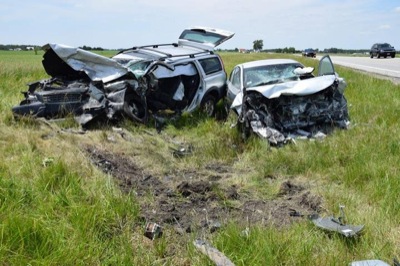Monday, June 9th, 2014
Ohioans to pay more due to coal restrictions
Obama administration's proposed rules meant to cut carbon dioxide emissions
By William Kincaid
ST. MARYS - President Obama's newly proposed restrictions on existing coal-fired power plants will cost electric consumers in Ohio an extra $40 per month, according to Bill Roberts, vice president and CFO of Buckeye Power Inc.
And the Obama administration's goal of reducing carbon dioxide emissions 30 percent by 2030 would have a negligible effect on the environment when compared to the rest of the world's projected release of emissions from coal plants, he said.
"That entire reduction will be offset by less than one year's growth of the Chinese emissions," Roberts said Saturday at Midwest Electric's 77th annual meeting at Memorial High School.
Midwest Electric officials exhorted its members to take action against the proposed EPA regulations by contacting their legislators and joining the Co-op Owners for Political Action group.
"This last year, the administration went around Congress and ordered the EPA to unilaterally write regulations to limit carbon dioxide from coal units," Roberts said. "The EPA, unleashed, has proposed a two-step regulatory process - one is to limit carbon dioxide from new plants, new fossil fuel plants, and the second one that was just released this past Monday is to limit carbon dioxide from existing plants."
Roberts believes the EPA made a gross error in suggesting the technological fix - carbon capture and storage - is proven.
"The reality is, it's simply not commercially viable, not today," he said. "The technology won't be ready for many years and the regulatory regime for transporting and storing carbon dioxide is decades away. What's worse is that these regulations would accomplish very little and have no effect at great expense."
U.S. coal generation, Roberts said, represents only 3 percent of worldwide greenhouse gas emissions. And since peaking in 2005, U.S. carbon dioxide emissions have declined due to increased energy efficiency, a transition from coal to natural gas and a downturn in the economy, he added.
While U.S. emissions have dropped, they have tripled in China and doubled in India, Roberts said.
"Even assuming that every - we're talking every coal plant in America, all of them - were shut down today, (carbon dioxide) concentrations would drop from 4 parts per 10,000 to 3.96 parts per 10,000; global temperatures would be reduced by three one hundredths of a degree - I don't have a thermometer that measures that," he said. "And the catastrophic rise in the world's sea level goes up a whopping 1 millimeter, about the thickness of a dime."
Based on initial rough estimates, electricity consumers in Ohio - who draw 80 percent of their power from coal - can expect to pay $40 more a month, Roberts said. The comment provoked an audible gasp from Midwest Electric members who haven't seen a distribution rate increase since 2010.
The effects will be disproportionately higher for lower-income houses in rural areas and inner cities in Ohio, Roberts said.
Roberts said he strongly doubts whether China would ever agree with the idea of an emissions-cutting policy.
"Why have they not adopted technology that we've been using for 50 years?" he asked, noting the ash-removing equipment added to power plant stacks in America that China hasn't yet obtained.
Buckeye Power's coal-fired plants that supply Midwest Electric's 11,000 meters are equipped with state-of-the-art environmental controls - such as mercury and acid aerosol removing technology - due to the company voluntarily investing $1.26 billion during the last decade. The results are reductions of 95 percent of sulfur dioxide, 90 percent of nitrogen oxide and 85 percent of mercury, according to Roberts.
"We do have among the cleanest coal-fired generation in the world. That's not enough for some," Roberts said, noting the new regulations would be a great expense to consumers.
The new regulations also could dampen electricity production in the PJM Interconnection market, the nation's largest power grid in all or parts of Delaware, Illinois, Indiana, Kentucky, Maryland, Michigan, New Jersey, North Carolina, Ohio, Pennsylvania, Tennessee, Virginia, West Virginia and the District of Columbia.
"In this area, from 2011 to 2013, 11,000 megawatts of base-load coal plants were retired. To complicate matters for reliability purposes, in less than one year, by next April, another 13,000 megawatts of coal-fired generation that does not comply with the more strict environmental laws will be retired," Roberts said.
Almost all of the plants expected to shut down were running at full steam during this past winter's peak, he said.
"Now across the PJM Interconnection, the grid strained to keep up and came perilously close to running short of their generation capacity," he said.
On Jan. 7, the reserve power requirement of 1 percent - relied on to adjust to changes in demand and generation - dropped to .3 percent, coming close to causing rolling blackouts, he explained.
"It's been a sober awakening for those of us that have been behind the scenes and looked at this," Roberts said. "Much of the shortfall was due to the lack of generation from natural gas-fired plants that were offline due to pipeline constraints. As a nation, we are going to continue to rely more heavily on natural gas-fired plants due to the coal plant shutdowns. It's easy to see if we get the same cold weather in the next few years, we're going to have some serious troubles."
Midwest Electric CEO Rick Gerdeman asked more members to join the Co-op Owners for Political Action.
"Midwest has 8 percent of their members in COPA, number one of all electric co-ops in the country, but guess what? That stinks."
He also urged everyone who gets an electric bill to contact his or her legislators and the EPA to voice one's concerns about the proposed regulations.
"The spark has been set for major political and legal battles in the matter," he said. "This is not over, but it's going to be an uphill battle because, again, the EPA mandate says this will happen."




